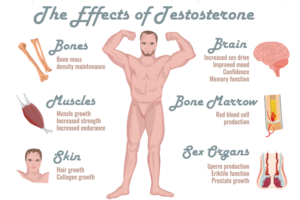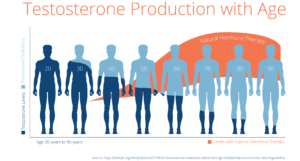Testosterone, often referred to as the “male hormone”, is commonly credited as the essence of masculinity itself. This reproductive hormone plays a pivotal role in men’s health, vitality, and overall quality of life, but it is also a lot more than it is conventionally assumed to be. From adolescence through adulthood, testosterone influences many aspects of physical, mental, and sexual well-being, indeed shaping the essence of masculinity and general health for men.
This hormone is not merely responsible for the development of male reproductive organs and sexual function but also directly contributes to muscle mass, bone density, cognitive function, mood regulation, and libido, among other crucial functions.
While it is somewhat natural for testosterone levels to decline with age, recent decades have witnessed a concerning trend of diminishing testosterone levels among men at younger ages, leading to growing concerns about the widespread occurrence of low testosterone or “low T” as it is often referred to.
The Rising Concern of Low Testosterone
Over the past few decades, researchers and healthcare professionals have observed a notable increase in the prevalence of low testosterone levels among men globally, sparking discussions in the medical community and drawing public attention due to its potential implications for men’s health and well-being.
This surge in low testosterone levels has been linked to various health issues, spanning from physical conditions such as decreased muscle mass and osteoporosis to psychological challenges like depression and cognitive decline. Moreover, low testosterone can adversely affect sexual function, fertility, and overall quality of life.
Recognizing the multifaceted impact of testosterone deficiency on men’s health, there’s a growing need to look deeper into the underlying causes of this epidemic and explore effective strategies for prevention and management.
Testosterone: The Hormone of Vitality
Testosterone, often seen as “what makes a man a man” plays a pivotal role in men’s health beyond its reproductive functions, and is often overlooked or over-simplified to just be about “muscles and sex drive”. Produced primarily in the testes, testosterone influences various physiological and psychological processes that are essential for overall well-being.
It should be noted also that while testosterone is essential for male health, it is also a key regulatory hormone in women as well. It is a little-known fact that women actually have more testosterone than estrogen – so testosterone is important for everyone, though it is especially key for males.

Beyond reproductive function, testosterone directly contributes to the regulation of muscle mass, bone density, and fat distribution, impacting physical strength and overall body composition. Equally as important, testosterone plays a vital role in cognitive function, influencing memory, spatial abilities, and cognitive processing speed. Its effects on mood regulation are significant, more than most people have realized until recently, with low levels being linked to an increased risk of mood disorders such as depression and anxiety.
Of course, as it is commonly known, testosterone is closely associated with libido and sexual desire, essential components of sexual health and overall satisfaction.
While testosterone levels typically peak during adolescence and early adulthood, they gradually decline with age, starting around age 30 at a rate of approximately 1% per year. This age-related decline, known as andropause or late-onset hypogonadism, can lead to symptoms associated with testosterone deficiency. Understanding these natural fluctuations in testosterone levels with age allows us to distinguish between normal aging processes and pathological conditions such as hypogonadism, where testosterone levels fall below the normal range and cause clinical symptoms.

The Epidemic of Low Testosterone: Prevalence and Causes
The epidemic of low testosterone levels has become increasingly concerning over recent years, prompting extensive discussions within the medical community and raising public awareness due to its significant implications for men’s health and well-being.
Low testosterone levels have been associated with a wide range of health issues, ranging from physical ailments such as decreased muscle mass, osteoporosis, and increased fat accumulation to psychological challenges like depression, anxiety, and cognitive decline; decreasing testosterone has strongly correlated with the male mental health crisis that we are also in. Furthermore, low testosterone can impact sexual function, fertility, and overall quality of life, posing substantial life burdens on affected individuals and the trajectory of their romantic and family lives.
By addressing the root causes of declining testosterone levels and implementing targeted interventions, healthcare professionals have an opportunity to mitigate the adverse health outcomes associated with testosterone deficiency and improve the overall well-being of affected individuals.

Unfortunately, there is a significant trend of simply adding more testosterone to the male system, both medically through doctors and testosterone clinics, but also through black market solutions (this is particularly prevalent in the bodybuilding community) which is a complex science and not as straightforward as it would seem. Taking exogenous (externally/synthetically sourced) testosterone can actually shut down the testes’ ability to naturally produce testosterone, which often creates a vicious cycle of exogenous testosterone dependency and can exacerbate this growing epidemic of low testosterone production in men.
The complexity of this issue requires and urges society to take a holistic approach to male hormonal health so that we can mitigate the immediate symptoms and also hopefully get to the root of the declining testosterone levels once and for all.
Shanna Swan’s Research on Environmental Factors Leading to Low Testosterone
Shanna Swan, one of the world’s leading environmental and reproductive epidemiologists, is widely recognized for her groundbreaking research on the modern testosterone epidemic.
Based out of the Icahn School of Medicine at Mount Sinai in New York City, Dr. Swan has published more than 200 scientific papers and has had extensive media coverage spreading the word on what she believes to be a global reproductive crisis.
She was even invited to appear on the Joe Rogan Experience, one of the most listened-to podcasts in the world, to discuss her groundbreaking book “Countdown – How Our Modern World Is Threatening Sperm Counts, Altering Male and Female Reproductive Development, and Imperiling the Future of the Human Race”
Her work explores the effects of environmental pollutants, particularly endocrine-disrupting chemicals (EDCs), on human reproductive development and health. Dr. Swan’s research has revealed the pervasive presence of EDCs in the environment, awakening the public to their detrimental impacts on fertility, hormone levels, and reproductive outcomes in both men and women.
Her studies have shown a particularly important link between exposure to EDCs and declining testosterone levels among men, shedding crucial light on the epidemic of low testosterone and showing us a potential root cause that we can actually do something about. Dr. Swan’s contributions have significantly advanced our understanding of the environmental factors influencing reproductive health, with profound implications for public health policies and interventions aimed at mitigating the adverse effects of environmental exposures on hormonal health.
For more information from Dr. Swan, check out her book here or this short video from After Skool, which is a brief overview of her work on this fertility crisis.
Lifestyle Choices and Testosterone Levels
In addition to the various environmental factors like the ones addressed by Dr. Swan, lifestyle choices also play a key role in determining testosterone levels in men. The main areas that influence healthy hormonal levels are as follows:
Diet and Nutrition
Dietary choices play a significant role in healthy testosterone levels. A balanced diet, abundant in protein, healthy fats, vitamins, and minerals, is pivotal for optimal testosterone synthesis. Foods such as lean meats, fish, nuts, seeds, fruits, and vegetables supply essential nutrients crucial for hormone production and metabolism. Conversely, diets laden with processed foods, sugars, and unhealthy fats can exacerbate insulin resistance, obesity, and inflammation, all of which can hamper testosterone levels. Nutritional deficiencies, particularly in vitamin D, zinc, and magnesium, have been linked to suboptimal testosterone levels, underscoring the importance of addressing dietary inadequacies through dietary adjustments or supplementation.
Exercise and Physical Activity
Regular physical activity is integral to maintaining healthy testosterone levels. Both resistance training and aerobic exercise have been shown to elevate testosterone levels, enhance insulin sensitivity, and bolster overall metabolic health when done properly with adequate recovery. Activities such as high-intensity interval training (HIIT) or weightlifting prompt the release of anabolic hormones, including testosterone, fostering muscle growth and strength gains. Furthermore, consistent exercise aids in reducing body fat and mitigating levels of cortisol, a stress hormone that can impede testosterone production.
Stress Management
Chronic stress poses one of the most significant threats to testosterone levels and hormonal equilibrium. Prolonged exposure to stressors escalates cortisol production, which can suppress testosterone synthesis and disrupt endocrine function. Implementing stress management techniques like mindfulness meditation, deep breathing exercises, yoga, or spending time in nature can alleviate stress levels and fortify healthy testosterone production. Prioritizing sufficient sleep and relaxation is also imperative for optimizing hormonal health and overall well-being.
Drugs and Alcohol
Another area of life that is often overlooked regarding testosterone levels is drug use. Abstaining from excessive alcohol consumption, smoking, and recreational drug use is a huge point to leverage for the maintenance of healthy hormonal levels. Additionally, minimizing exposure to environmental pollutants, such as pesticides, plastics, and industrial chemicals, all of which are found in many conventional drugs and alcohol, can lighten one’s burden of endocrine-disrupting chemicals.

Lifestyle choices are something that people seriously need to consider as we venture deeper into this epidemic of reduced testosterone levels and overall hormonal health. By embracing a wholesome diet, engaging in regular exercise, effectively managing stress, and avoiding harmful substances, people can do a lot to cultivate optimal testosterone production and maintain vibrant health. Coupled with ongoing research and awareness, lifestyle modifications serve as a cornerstone for tackling the epidemic of low testosterone and fostering a culture of proactive health management.
Closing Thoughts
In the world of men’s health, testosterone stands as the cornerstone of vitality and masculinity. Healthy hormonal levels play a crucial role in so many physiological and psychological processes, shaping not only physical attributes but also cognitive abilities, mood regulation, and overall well-being.
We are witnessing an unprecedented trend of declining testosterone levels among men, sparking concerns about “low T”. Seeing that reduced testosterone is associated with a range of serious health issues ranging from decreased muscle mass to cognitive decline, we can see there is an urgent need to get to the root of this issue and explore effective strategies for prevention and management before things get worse.
Through the extensive studies of experts like Dr. Shanna Swan, we have begun to illuminate the role of environmental pollutants, particularly endocrine-disrupting chemicals, in disrupting hormonal balance and hugely contributing to this decline in testosterone levels. Her work has not only raised awareness about the pervasive presence of EDCs in the environment but also highlighted their detrimental effects on reproductive health, shedding crucial light on the epidemic of low testosterone and outlining the need for more mindful consumerism as well as industrial innovation.
Alongside environmental factors, lifestyle choices also play a significant role in determining testosterone levels. From dietary habits and exercise routines to stress management techniques and avoidance of harmful substances, individuals do indeed have the power to positively influence their hormonal health through proactive lifestyle optimization and healthier habits.
In addressing the epidemic of low testosterone, we must adopt a holistic approach that encompasses both environmental and lifestyle factors. By integrating insights from scientific research, raising awareness, and empowering individuals to make informed choices, we can cultivate a brighter future where optimal testosterone levels and vibrant health are attainable for all. Through collective efforts, we can navigate through this modern challenge and pave the way for a healthier, more resilient generation of men, women, and children.








